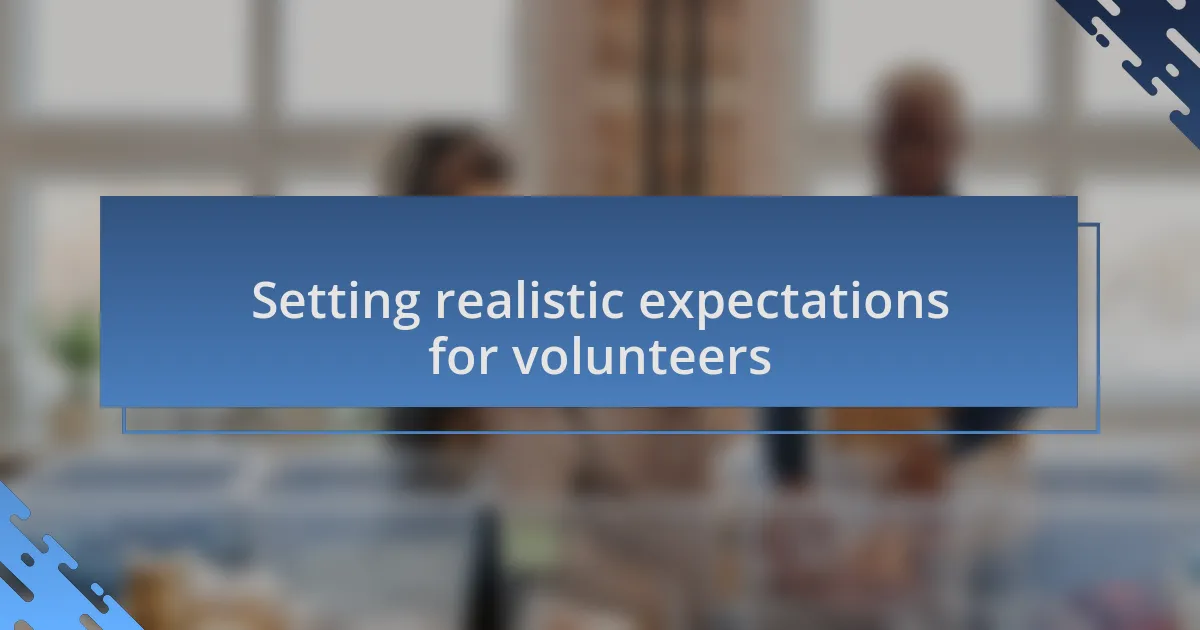Key takeaways:
- Mentoring new volunteers fosters empathy, trust, and personal growth, emphasizing vulnerability and connection.
- Effective mentors listen actively, adapt their approaches, and share personal experiences to create a trusting relationship.
- Setting realistic expectations and celebrating small victories helps volunteers navigate challenges and enhances their sense of belonging.
- Building genuine connections and providing feedback strengthens relationships and encourages volunteer commitment and engagement.

Understanding homeless charity mentoring
Mentoring new volunteers in a homeless charity is about more than just guidance; it’s about building a community of compassion. I remember my first days as a mentor, feeling a mix of excitement and responsibility. How could I instill the importance of empathy in those eager to help? It struck me that mentoring is like planting seeds of understanding, where each conversation helps new volunteers recognize the humanity in each individual they serve.
As we dive into the complexities of serving the homeless, it’s essential to share not just facts, but personal experiences. During one session, a volunteer shared their struggles connecting with a homeless individual—they felt unsure of what to say. I gently reminded them that sometimes, a simple smile or listening ear can mean the world. It’s these moments of vulnerability and connection that truly define the mentoring experience, don’t you think?
Understanding the essence of homeless charity mentoring also means embracing the transformative power of trust. I once had a mentee who initially felt overwhelmed by the stories they encountered. I encouraged them to see these narratives not as burdens, but as opportunities to learn and connect on a deeper level. Isn’t that what this work is about? Finding strength in vulnerability and fostering resilience—not just for those we serve but for ourselves as well.

Importance of mentoring new volunteers
The importance of mentoring new volunteers cannot be overstated. From my experience, mentoring creates a supportive atmosphere that encourages volunteers to share their fears and apprehensions. I remember one volunteer who admitted to feeling intimidated by the stories of hardship they would encounter. Through our one-on-one discussions, we built a rapport that allowed them to view these experiences as an opportunity for growth rather than an emotional barrier. Isn’t it incredible how a little guidance can transform anxiety into confidence?
Mentoring also promotes skill development among volunteers, ensuring they are equipped to serve effectively. I recall a training session where a volunteer struggled with understanding the specific needs of the individuals we assisted. By walking them through real scenarios and discussing actionable strategies, I saw their perspective shift. They started asking questions about how to approach sensitive topics, which highlighted their evolving understanding. Don’t you think it’s moments like these—when curiosity ignites compassion—that showcase the true power of mentorship?
Moreover, mentoring helps to cultivate a sense of belonging within the organization. I’ve seen how new volunteers who receive guidance become more invested and engaged over time. One mentee, who originally felt like an outsider, blossomed into a vital team member once they felt supported. It makes me wonder: how many potential advocates remain unseen without the right encouragement? The bond formed through mentorship not only strengthens the individual volunteer but enriches the entire charity, creating a more cohesive and passionate team.

Key qualities of effective mentors
Effective mentors possess a remarkable ability to listen actively. In my experience, this quality is essential, especially when new volunteers share their concerns. I remember a moment with a volunteer who was grappling with the emotional weight of their role. By simply listening and validating their feelings, I could help them navigate their challenges. Isn’t it fascinating how a genuine ear can make someone feel truly understood and valued?
Another key quality is adaptability. Each volunteer comes with their unique backgrounds and learning styles, which means there’s no one-size-fits-all approach. I once worked with a volunteer who thrived on visual aids but struggled with verbal instructions. By adapting our training tools to include diagrams and hands-on activities, I witnessed their enthusiasm grow. Have you ever noticed how a small tweak in approach can lead to significant personal breakthroughs?
Lastly, empathy is crucial in fostering a trusting mentor-mentee relationship. When I reflect on my own mentoring experiences, I realize that sharing my own challenges helped build trust. I opened up about times I felt overwhelmed, which encouraged my mentees to share their vulnerabilities as well. It makes me wonder: how can we inspire openness without first being willing to show our own? This empathy creates a safe space where new volunteers can flourish and embrace their roles with confidence.

Setting realistic expectations for volunteers
Setting realistic expectations for volunteers is critical to their success and satisfaction. I recall a new volunteer who joined with high hopes of single-handedly transforming the lives of those we served. While their enthusiasm was admirable, I knew it was vital to gently guide them toward a more practical understanding of the gradual, cumulative impact of our efforts. Isn’t it interesting how sometimes the most significant changes come through consistent small steps rather than monumental acts?
In another instance, I worked with a volunteer who quickly became disheartened after their first outreach event didn’t yield the results they anticipated. I took the opportunity to explain that some days would be challenging and that it’s essential to celebrate even the smallest victories. Discussing this openly helped them realize that every effort counts, reinforcing the idea that volunteer work is a journey, not a sprint. Have you found that even a slight shift in perspective can alter one’s approach and motivation significantly?
Lastly, I always emphasize the importance of self-care and reflection. I remember times after an intense day of volunteering when I felt emotionally drained. By sharing that it’s okay to feel exhausted and encouraging volunteers to check in with themselves regularly, I foster an environment where they can recognize the necessity of balance. How can we effectively support our volunteers if we don’t first teach them to respect their own limits? Establishing realistic expectations not only helps them thrive but enriches the entire organization.

Building relationships with new volunteers
Creating genuine connections with new volunteers is essential in fostering a supportive atmosphere. I remember my first few weeks mentoring a group of newcomers. I organized a casual meet-and-greet where I encouraged everyone to share their motivations for joining our charity. It was fascinating to see how stories intertwined, revealing common goals and passions. Don’t you think that when volunteers feel a sense of belonging, they’re more likely to stay engaged and committed?
Trust is another vital component in building these relationships. I once worked closely with a volunteer who felt unsure about their role. By taking the time to have one-on-one conversations, I was able to learn about their concerns and aspirations. I shared my own experiences and missteps, which helped them see that vulnerability is part of growth. Have you ever noticed how openness can transform interactions and lead to deeper connections?
Moreover, I’ve found that providing regular feedback enhances the sense of partnership. After a recent project, I made it a point to highlight each volunteer’s contributions in a group discussion. Their faces lit up with pride when they realized how much their hard work mattered. It’s incredible how recognition can strengthen bonds and motivate individuals to do even more. Isn’t it rewarding to see volunteers flourish when they know their efforts are valued?

My personal mentoring experiences
Mentoring new volunteers has been a deeply rewarding experience for me. One instance that stands out is when I took on a shy individual who seemed hesitant in their role. I remember inviting them to shadow me during a project, focusing not only on the tasks but also on sharing stories about our past experiences. It was heartwarming to witness their gradual transformation; they blossomed into a confident contributor within just a few weeks. Isn’t it remarkable how genuine encouragement can unlock someone’s potential?
Another aspect of mentoring that I cherish is the opportunity for mutual learning. I once partnered with a fresh volunteer who brought unique skills from their professional background. They introduced innovative ideas that I had not considered before. It was an eye-opener for both of us, demonstrating that every mentor-mentee relationship can lead to a dynamic exchange of knowledge. Have you ever found inspiration in unexpected places? I certainly have, and it reinforces my belief in collaboration.
Moreover, I believe that celebrating small victories is crucial in mentoring. I recall a moment when a volunteer helped implement a new initiative successfully. Instead of merely acknowledging the end result, I organized a small celebration to honor their effort. It was touching to see their joy and pride radiate in that space. How uplifting it is to recognize the journey, not just the destination! Such moments strengthen our community and encourage everyone to take pride in their contributions.

Lessons learned from mentoring volunteers
The importance of patience became clear to me during one mentoring experience. I recall working with a volunteer who struggled with public speaking. Rather than pushing them too hard, I encouraged them to practice in a comfortable setting. Over time, I saw their anxiety transform into confidence, reminding me that growth often comes in small, gradual steps. Do you also believe that sometimes the slow process can lead to the most meaningful change?
Another key lesson was understanding the value of setting clear expectations. In one instance, I paired with a volunteer who was eager but lacked direction. After a candid discussion about their goals, we crafted a roadmap together. This clarity not only empowered them but also helped me align my mentoring approach. It made me realize how crucial it is to foster an environment where both mentor and mentee are on the same page.
I’ve learned that sharing my own vulnerabilities can strengthen the mentoring bond. During a workshop, I openly talked about my early missteps in volunteering, which created a safe space for others to share their fears. The camaraderie that emerged was palpable. This experience taught me that honesty fosters connection and trust—essential elements for growth in any mentoring relationship. Have you ever noticed how being authentic can spark deeper conversations?